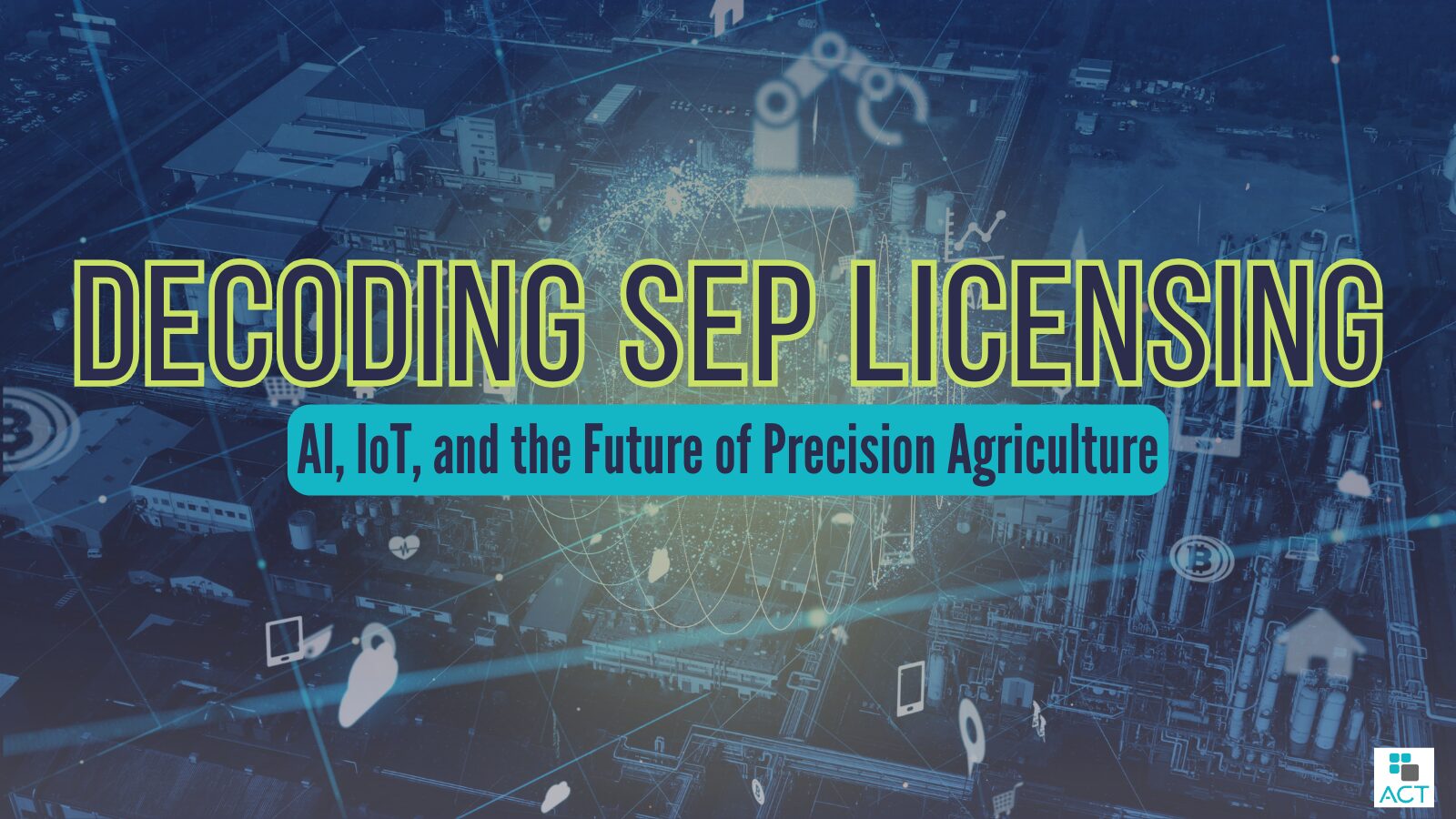In the heart of a modern farm, drones buzz over vast fields, sensors embedded in the soil relay real-time data, and AI-driven insights guide decisions from planting to harvest. This is the era of precision agriculture, where technology meets tradition to create a more efficient, sustainable, and productive farming landscape. By integrating the Internet of Things (IoT) and artificial intelligence (AI), farmers are transforming their operations, optimising resources, and reducing environmental impact.
A critical aspect of this transformation is technology standards and the licensing framework for the standard-essential patents (SEPs) that cover them. Understanding and navigating this complex domain is crucial for micro, small-, and medium-sized enterprises (MSMEs) innovating in the renewable tech sector. In this installment of our ‘Decoding SEP Licensing’ series, we delve into the intersection of SEP licensing, AI, IoT, and precision agriculture, highlighting the need for fair and transparent licensing practices to support sustainable innovation in agriculture.
Are you curious about the other blogs in this series? You can find ‘Part One: Decoding SEP Licensing: A Comprehensive Guide for the IoT and AI Revolutions’ here, ‘Part Two: Decoding SEP Licensing: IoT and the Future of Sustainable Technology’ here, and ‘Part Three: Decoding SEP Licensing: How Mergers are a Natural Pathway for IoT Growth’ here.
Precision agriculture
Precision agriculture is revolutionising farming by enabling the real-time collection and analysis of countless data points, enabling more precise control over agricultural practices. IoT sensors are deployed across fields to collect real-time data on soil moisture, nutrient levels, weather conditions, and even the presence of pests or invasive species. This data is then processed by AI systems, which analyse the information and provide actionable insights to farmers. By leveraging these technologies, farmers can make data-driven decisions that enhance productivity, minimise waste, and promote sustainability. These innovations not only benefit farmers by improving their yields and reducing their environmental impact but also consumers, as they contribute to a more secure and abundant food supply.
Member Spotlight: GrapeHawk
MSMEs are the driving force behind innovation, both in the precision agriculture sector and every vertical in our global economy. Startups like member company GrapeHawk are at the forefront of this technological revolution, developing next-generation solutions for digital transformation in farm and forest management through the integration of AI, cognitive robotics, and remote sensing to improve agricultural practices. GrapeHawk’s drones, equipped with advanced sensors and AI capabilities, monitor farms and forests to measure above- and below-ground moisture, make forest inventories, measure biomass, detect diseases, and apply plant protection products to optimise and increase management sustainability. By providing farmers with detailed, real-time information, their technology is key to improving productivity and sustainability in agriculture.
MSMEs like GrapeHawk bring agility and innovation to the industry, enabling rapid advancements and localised solutions that larger corporations may not address. Their contributions are vital for the ongoing digital transformation of agriculture, helping to create more resilient and sustainable farming systems.
SEP licensing and innovation
However, MSMEs’ journey in the precision agriculture space is not without challenges. The SEP licensing landscape can present significant hurdles, particularly for smaller companies that may lack the resources to navigate complex licensing agreements. SEPs are critical for the interoperability of technologies used in precision agriculture, from communication protocols to data processing standards. Yet, the lack of transparency and the potential for abuse in SEP licensing can hinder innovation and place undue burdens on MSMEs.
As we have seen across other sectors, SEP holders sometimes exploit their dominant position as a gatekeeper to the use of a standard despite their previous commitment to provide fair, reasonable, and non-discriminatory (FRAND) SEP licenses to all looking to use that standard. This creates an environment of uncertainty and financial strain for MSMEs that rely on standardised solutions to ensure interoperability across products and services. Ensuring FRAND licensing terms is crucial to fostering innovation and allowing MSMEs to thrive in the digital economy.
SEP licensing reform
Responsible, intentional regulatory reform is needed to address the SEP abuses already plaguing key industries like telecommunications and transportation and are now starting to make their way into smart agriculture. In recognition of the problem, policymakers in the European Union (EU) and the United Kingdom (UK) are already working towards improving the SEP licensing framework. Proposed measures would do much to improve transparency, certainty, and fairness through steps such as creating SEP databases, conducting essentiality checks, and mediating FRAND licensing negotiations. These initiatives aim to enhance transparency and fairness in SEP licensing, making it easier for MSMEs to access the technologies they need to innovate.
However, EU and UK policymakers cannot be the only leaders acting against SEP licensing abuses. As a sampling of our U.S. members recently outlined to Congress, regulators and policymakers everywhere must recognise MSMEs’ critical role in driving sustainable technologies and take decisive steps to address well-known anticompetitive practices by appropriately confronting SEP licensing abuses.
Conclusion
The intersection of AI, IoT, and agriculture holds immense potential for transforming farming practices and promoting sustainability driven by incredible MSME innovation. However, to unlock this potential, it is vital that we learn from past experiences of technology development in more mature markets. Ensuring a fair and transparent SEP licensing landscape that supports innovation and growth for MSMEs is crucial.
By prioritising improved SEP licensing frameworks that will mitigate demonstrated anticompetitive SEP licensor practices, policymakers can pave the way for a more connected future where precision agriculture thrives and contributes to global food security and environmental conservation. As we continue to explore the evolving world of SEP licensing, policymakers around the globe must remain committed to advancing rules and regulations that foster innovation and empower small businesses to lead the way in technological advancements.
